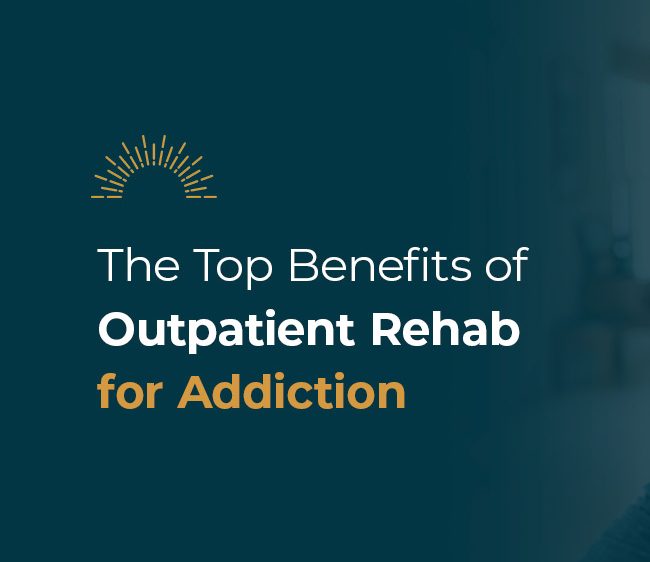
Content medically reviewed by Vicky Magobet, PMHNP-BC, on July 25, 2022.
Choosing to end your relationship with substances is a courageous and essential step toward recovery. And when you decide to enter outpatient rehabilitation, you'll have a team of professionals eager to support you through the process.
Outpatient addiction programs are beneficial for many reasons. You'll benefit from privacy and affordability while receiving addiction treatment during the day and returning home at night to be with friends and family. If you or a loved one is struggling with substance use disorder, learn how outpatient addiction treatment can help.
More than 21 million Americans struggle with substance use disorder, though not everyone will reach out for help. Depending on your lifestyle, the recovery process can present unique and unexpected challenges. For instance, you might be unable to pursue addiction treatment due to work, your home life or other circumstances. Or you may wish to continue receiving care after completing residential treatment. Either way, outpatient services can help support you through the road to recovery so you can start feeling better.
Outpatient drug treatment involves:
For clients seeking flexibility and privacy, outpatient drug treatment programs might be ideal. If you're unfamiliar with this type of addiction program, you may wonder what outpatient rehab is like.
The following are a few steps involved in outpatient rehabilitation:
Some clients will attend these sessions on the weekends or evenings during the week. Others may attend sessions during the day and return home in the evening. The amount of care you receive will depend entirely on your needs and whether you have underlying conditions that also need to be addressed.
Outpatient rehab is effective for treating all types of substance use disorders. These care programs provide high-quality, flexible care to help you overcome your addiction. Appreciate the following benefits of outpatient drug rehab:
The most significant advantage of addiction outpatient treatment is that it fits almost any schedule and lifestyle. Because outpatient services operate for just a few hours a day, multiple times a week, you can easily fit these services into your schedule and work out a plan for the days you'll attend therapy. If you have home, school or work obligations, you can tend to them while receiving treatment. You also get to sleep in your own bed and be supported by friends and family through recovery.
Outpatient drug treatment tends to be more private and offers more freedom than inpatient care and other forms of treatment. Inpatient care requires clients to reside in the facility with peers for the duration of their treatment, while outpatient programs allow clients to come and go as needed. This way, you'll maintain your privacy and only interact with the people who provide your addiction services. You'll generally have access to private doctors and therapists so you won't need to meet with anyone outside of these services.
The intensity of addiction outpatient treatment will depend on the level of care you need. With different levels of treatment, you can appreciate a specially-tailored program to help you beat addiction and get your life back on track. Types of programs offered in outpatient care include:
Substance use disorder is a chronic condition that often requires long-term care. As a result, many people opt for outpatient services at the conclusion of their residential programs. This way, they receive ongoing treatment and support to stay sober and learn the necessary skills to continue their newfound healthier lifestyle.
While the cost of treatment facilities varies, outpatient care is generally more affordable than inpatient treatment. Since you won't pay for housing or food costs, outpatient care allows you to work on your sobriety while meeting your budgetary needs. Ultimately, the price of care will depend on how often you visit the care center and for how long.
Outpatient care might be better suited for some individuals than others. This will come down to the client's lifestyle and the level of care they require. With outpatient programs, you'll appreciate a flexible schedule to get the most out of your treatment.
Outpatient rehab programs tend to work best for people who:
While addiction recovery presents unique challenges, you never have to go at it alone. If you or someone you know is suffering from substance use disorder, Diamond House Detox can help you overcome the cycle of addiction and improve your overall health and wellness. Our outpatient care services are client-focused to provide individualized care and promote a sober, healthier lifestyle. When you choose our services, you'll have access to a highly-trained team of addiction specialists eager to work with you.
To learn more about our outpatient care programs, get in touch with us today.
Linked Sources: